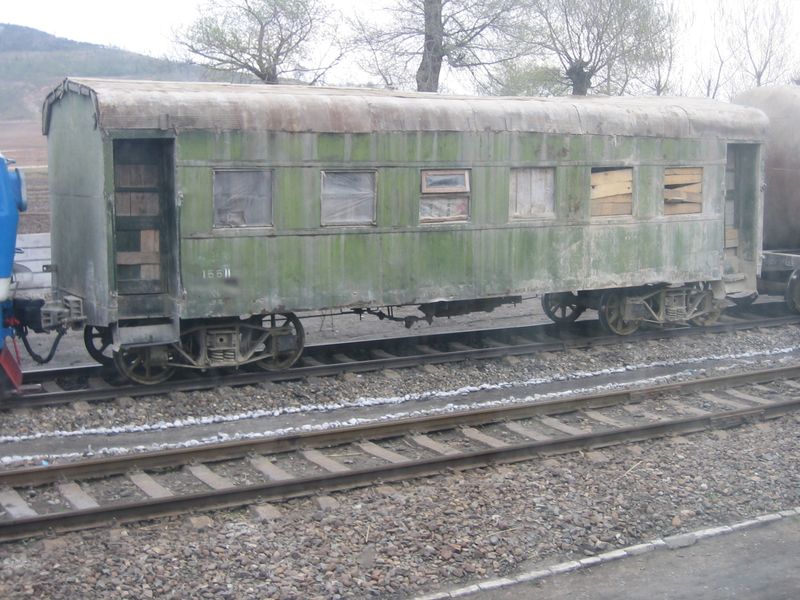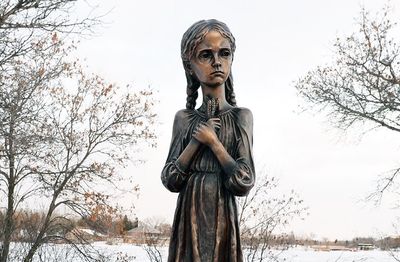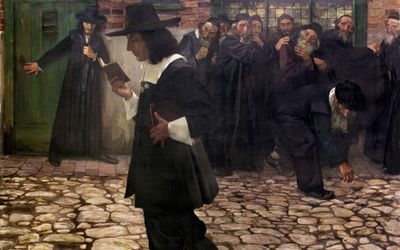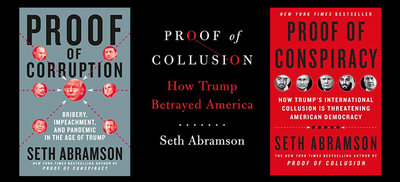A Week In North Korea
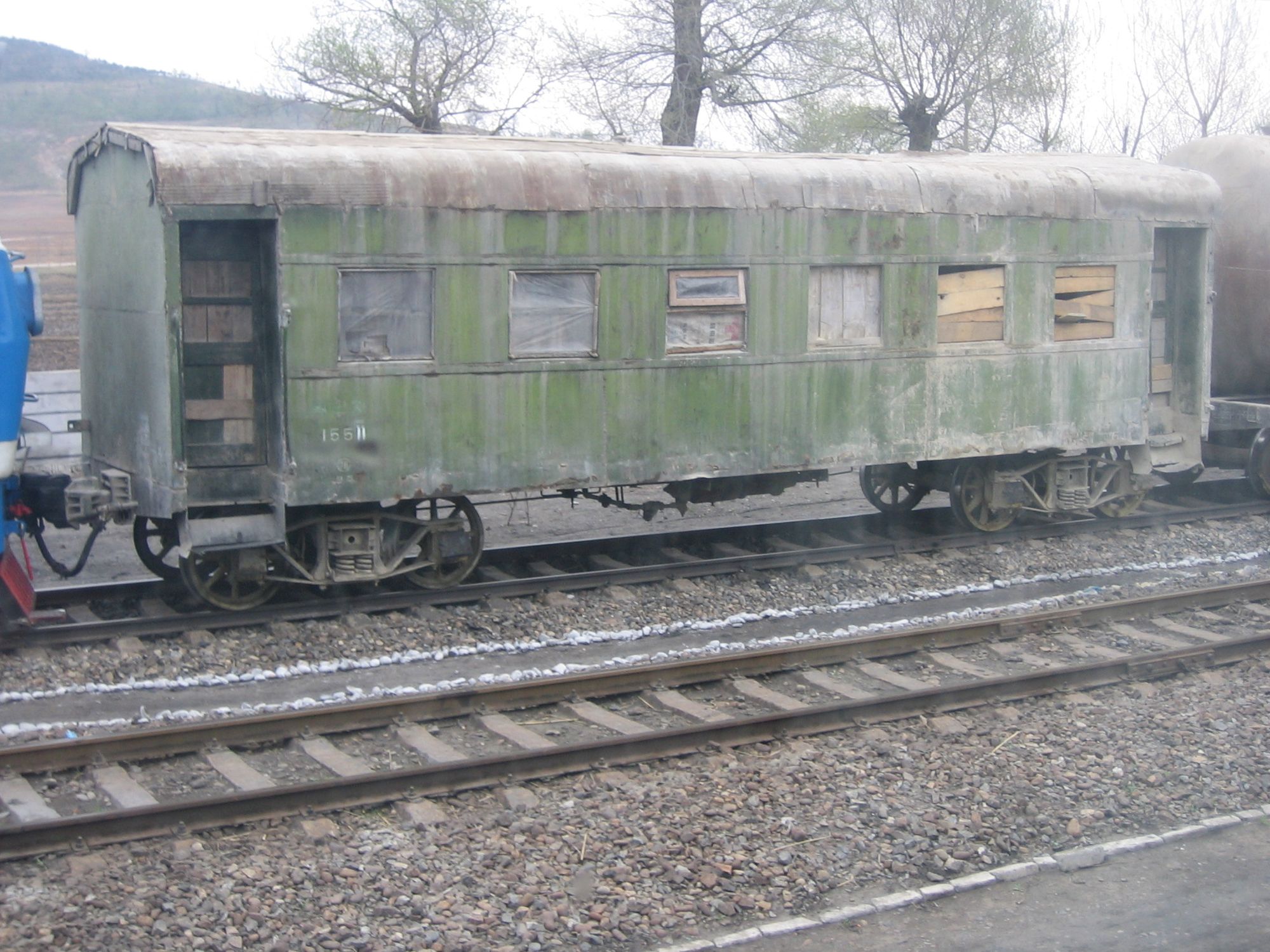
A Week In North Korea
I’ve written an extended piece about travels in North Korea but chose here to offer just a few snapshots to convey a sense of the experience.
If you are caught swimming in the Yalu River that divides China and North Korea, your body will be riddled with bullets fired from either side—or both. But a sacred North Korean visa—the coveted rare one permitting entry of only 300 Westerners in 2006—would get us on a train over the river and into the country and, all being well a week later, get us back over the river and safely out.
Over the Internet, I’d tracked down two British men living in Beijing. They said they could help get us into North Korea, but there were no guarantees. In fact, there was little in the way of normal travel arrangement protocols to give us confidence. They promised to meet up with us once we were in Beijing, take our passports to the North Korean embassy, and return them a day later with the necessary travel visa implanted.
We met them in a bar.
I felt a rush of bad judgment as we handed over our passports, but this meeting had the aura of how such business—however clandestine—was conducted. As they left us sitting there nursing our second beer and apprehensions, the taller one handed us their travel company’s business card and told us to meet them at their office the following day at noon.
To sit in a Chinese bar and give up my passport felt like a setup for a punch line I didn’t want to hear. In exchange, we’d been given sheets of paper covering the rules, expectations, and mandatory conduct while we were in North Korea. None of it was negotiable. We were also told to refrain from using “North” as a designator; it indicated that one didn’t respect or understand the nation’s pride in being the true Korea. Alternatively, we could refer to it as “the DPRK,” the Democratic People’s Republic of Korea.
These were the rules:
1. No contact is to be made with DPRK citizens.
2. No contact is to be made with DPRK currency.
3. Any photography must first be approved by the minder. Images of any government installations, soldiers, poverty, or anything likely to cast the current regime in a negative light are forbidden.
4. Cell phones may NOT be brought into the DPRK.
5. Laptops may NOT be brought into the DPRK.
6. Travel anywhere outside of the hotel MUST be approved by, and accompanied by, the minder.
7. Leaving the hotel without permission is forbidden. The grounds may only be walked with a minder and without a camera.
8. The first stop inside the DPRK is a 20-meter bronze statue of Kim Il Sung; a bouquet of flowers should be bought and placed at the feet of the statue, and a bow of respect is essential in bonding with your minders. Should you feel uncomfortable in following this procedure or in feigning admiration and grief, the DPRK is not for you.
9. Do not criticize Kim Il Sung, Kim Jong Il, the government, its policies, food shortages, the lack of a McDonald’s or the shortage of ATMs; or query if they have a mandated dress code; or propose, even philosophically, that they could turn their country around with one bullet. North Koreans believe they live in the best country in the world and trying to convince them that they live in the worst of all possible worlds will not make your visit a happy one.
10. The DPRK is a socialist republic and, despite the D for Democratic, the republic is recognized as a family-owned Stalinist totalitarian dictatorship.
11. Do not bring these pages with you into the DPRK. Please leave them with your belongings in China. Again, please don’t bring these with you.
***
Sean, Dad, and I embarked on a 23-hour journey by train.
A long, forest-green train affixed with Peking-Pyongyang (Korea still referred to Beijing as Peking) signs sat at platform four. The Chinese operated it. The carriage attendant thoroughly examined our documentation, checked our DPRK visas, and allowed us into his wagon. Excited by the start of another train trip, we parked our happiness when a fellow passenger stood at our roomette’s doorway. He was Japanese and in his later 30s. Together we glanced at his ticket and then the room number, and finally calculated that he was our cabin’s fourth occupant. This threw everything into disarray. I’d already lost rock-paper-scissors and had a top bunk; he owned my bottom bunk. Even though he looked friendly enough, my imagination hovered over a question: was he a spy? Would we have to self-edit our family conversations (which were normally as unrestricted as an X-rated movie, and politically cavalier) or risk being turned into the authorities at the border?
The train lurched, and the couplers clasped as the four of us peered out the windows in the hallway. Beijing’s massive station and the miles of track crossings and rolling stock dragged past my window for a half hour. Then heavy industry sided the tracks, belching unfettered pollution and carbon dust into the Gobi-dust-soaked air. Screw the Kyoto Accord, screamed the chimneys.
The train crossed the Sino-Korea Friendship Bridge, parallel to a train bridge that abruptly ended in the middle of the river. The Americans had bombed this “Broken Bridge” (as it’s sometimes known) in 1950 during the Korean War, and it had been repurposed as a tourist destination; many people walk to the end to catch a glimpse of the DPRK through telescopes. But we were slowing down to ultimately make our stop in the country itself. To our left was an attempt at a children’s park, featuring a timeworn Ferris wheel. On the right was a large building with Kim Il Sung’s beguiling smile posted dead center at the very top.
If there is no word that means you don't have the concept. In North Korea, they eliminate the words: depression, stress, dictatorship, human rights. You cannot think of those. That's why all the brainwashing was possible. Park Yeon-mi
It was dark when Pyongyang finally came into view; in fact, Pyongyang itself was dark. We crept from the countryside into the urban setting with darkness the common attribute. It is a large city, but only a few tall buildings had lights on, and those would be single lights—one or two within each building. Were it not for the immense railway station, the many people, and–we hoped–our government minders, it would have been hard to tell we’d arrived in a huge city?

A mesmerizing piece of music flowed throughout the station and through the moment; it was channelling the magic and wonder of Korean intimacy, political and otherwise. The welcoming song played loudly over the platform. The music, both eerie and transcendent, broke through our prejudices and their rules, disarming us. The singer’s voice glided along with beautiful notes and was only familiar in a foreign sense of new music to old ears. Steam spit from the train’s brakes and the carriage doors creaked open. A woman of about 30 stepped forward, introducing herself as Kim Liew, and her government-minder peer as Mr. Li. Both wore modest business attire and sported a red pin on their left breast pockets. The red pin had a face. It was Kim Il Sung, smiling at us.
“Welcome to Pyongyang, Korea!” Kim Liew took my hand, giving it a shallow shake. Mr. Li proffered the same soft handshake. He was a small, thin man of about 25 and peered at us through thick eyeglasses.
“Is this your first time to Korea,” Kim offered? He smiled with ample knowledge that indeed it was. I don’t know what the repeat visitor rate is, but I suspect most people who visit North Korea do so only once. Because twice is suspicious on so many levels.
“Please, you must call me Kim!”
As we chatted, I noticed that both were wearing the same Kim Il Sung lapel pin. We pulled our luggage onto the waiting minibus and were soon introduced to Chook, our new driver. He too had the lapel pin. Chook was about 60 and smoked. He seemed tired of life as well as having a head full of secrets. When he looked at you, he was reading you. But a smile meant he liked what he read. And he smiled at us a lot.
We are categorically against any new military nuclear power, be it Iran, be it North Korea, be it, anyone.
— Sergei Lavrov
Kim met us in the lobby one morning; quite happy it was the first of May.
International Workers’ Day on May 1 is a mega-national North Korean holiday. The stadium we’d seen was named the May Day Stadium, it is the largest in the world, holding 60,000 people. It was important enough for Kim and Mr. Li to pull the widest smiles to date. Chook wasn’t smiling but seemed preoccupied. (Again, my imagination credited this wise man with nefarious projects; perhaps he was adding up the costs of shipping a cell phone tower he’d acquired through channels who had bought it off Craigslist.)
We drove into a busy street lined with hundreds of North Koreans. We had arrived at Moranbong Hill, with steps that ascended beyond view. My New Year’s resolution every year is not to break more sweat than the year before. But my family and Mr. Li were climbing happily, like North Korean soccer moms between the state brainwashing finals and piano lessons. Kim was not about to let me out of her sight. She said there were old pavilions to see, sentinel towers and gates that date back to the 5th century.
All over Moranbong Hill, ordinary people seemed to be picnicking–in the forested areas, on the little patches of spring grass. It was the one occasion travellers like us would ever have to encounter North Koreans one on one. From within a thousand picnickers, a woman in her sixties, standing with six or seven friends, broke into song. The Korean lyrics carried on in murmurs from others, then one person and then another accompanied her.
They were drinking bottles of May Day beer, and some had begun to work their way through the first week of May rather quickly. This woman, whose voice could carry better than FM radio, came towards me doing a swan maneuver with her arms. She grabbed my hand. In my paranoia about North Korea, I feared numerous laws were being broken. As the British guys in Beijing had amply warned us, harsh punishment for the likes of Mrs. Liu in such an instance could be severe. It would not be us who could pay the price; it could be her. Yes, I could be sent back to China, but her family and extended family could suffer. This was a highly illegal activity.
Yet, we danced. What else could I do? If Kim Jong-Il asked me directly why I had danced with that woman, I would have told him that, although she was happy for a day free from her job granted her by the state, she was also happy because a stranger befriended her lyrical voice and danced a dance neither of them would ever forget. It was like dancing with twenty kilos of cocaine.
Kim didn’t fetch the dance police. Instead, she said it was ironic that this was the one day a year you would catch Koreans behaving like this.
“If you only knew,” Kim said, “how few visitors ever get to meet a citizen, you’d be surprised. What you did today, no foreigner has done.”

The next morning Mr. Li banged on our hotel room’s door to make sure we were up and ready. His grunts in Korean conveyed there was no room for error in today’s itinerary given the specialness of our mission. The five of us were herded into the lobby and headed outside. Chook slid open the door, nodding hello. We were on our way to the Joint Security Area of the Korean Demilitarized Zone (DMZ)–otherwise known as Panmunjom–the most hostile border in the world.
Soon we were on the six-lane Reunification Highway heading 125 miles (215 kilometers) south to the border. Hours passed; cars did not. It is three lanes in each direction, with no overpasses; in three hours I counted five vehicles heading towards Pyongyang. If North Korean fighter planes needed an alternative landing and take-off platform in case of an American invasion from South Korea; this highway was designed for that function.
Nearing the passive city of Kaesong, Sean noticed a sign reading 70 km. “Is that the distance to the DMZ?”
“No,” said Kim. “That is to Seoul.”
We let the presumptuousness sit alongside the implausibility of passage. Between where we drove and Seoul lay an entrenched military build-up on both sides of the border, with enough power to obliterate the population of both countries.
At a lookout point, we stopped. We looked out across minefields and tank traps, barbed wire and trip-cords separating us from South Korea. Two sophisticated binoculars were set up on tripods to allow us to focus in on military installations five miles across the strip of horrific real estate.
“Sometimes across there, you can see people. They raise flags or paint graffiti like ‘Democracy and Freedom,’” Kim told us. “But today there is nothing.”
“Maybe they’re hung-over from May Day,” I offered.
***
The DMZ is the celebrity site of any visit to the DPRK. The security officials found Kim’s pass had expired, and she was not allowed to proceed. She was escorted away to await our return. When your guide is denied access, it is prudent to consider your privileges of passage.
Chook pulled up to a series of buildings and Mr. Li encouraged us inside with wide arms, as though he were trying to herd chickens. Standing in front of a large relief map, a guard was using his yardstick to wrap up the story of the Korean War. Before him sat the tour group that jostled around our itinerary since Beijing. We came in at the part where the guard was explaining his disgust for America.
We were guided onto a tour bus that would take us the final few miles to Panmunjom, where the Korean Armistice Agreement was signed in 1953. As we pulled away, following a shiny black car of importance, the Reunification Highway’s six lanes narrowed to the width of a large tour bus. On either side of the road were granite cubes 10 feet by 10 feet by 10 feet, perched on ledges, ready to be dropped onto the road should tanks try to invade. Both sides of the two-and-a-half-mile wide strip of land between the Koreas were heavily armed with pillboxes, tank barricades, barbed wire, and land mines.

Panmunjom posed not a whole lot of danger or threat to us. The tour’s focus was a building that housed the red booklet that outlined the terms of the 1953 Armistice Agreement. Again, we listened to the story of US stupidity and arrogance. I decided to step outside where a few fellow travelers stood on the pavement talking. It was a close-knit feeling, not to know someone but to be sharing an incomparable moment. I overheard one man telling others that North Korea was the 202nd country he’d visited. My ears perked upon hearing that amazing number; he had fewer than ten countries to go and he’d have been to everyone on the map. Someone asked him about his favorites and least favorites. He plummeted in my eyes with each answer. He belittled countries and cultures that were unlike his own as if they were hobbies rather than societies. He looked down on those of us who’d barely seen the world he had. He denied himself when he spoke.
“India would be among my favorites if there weren’t so many Indians there,” he laughed as if that were a funny statement. “There are places in the world you don’t need to see. There’s nothing there to learn. For much of the world, it’s worth paying for a sightseeing bus tour, seeing the opulent key sites, and getting out. You can do Paris in three hours, Tokyo in two, and Moscow in the afternoon but that’s because of the traffic. Seeing the reality that every country hides isn’t worth the cab fare.” His arrogance was palpable. His commentary was disappointing, simplistic, and judgmental. None of the lessons of true travel had washed over him. “All destitute people have the same things in common. They will do anything to get your wallet….”
I walked away. He was a racist and bigot who viewed his wide world through narrow lenses. From what I’d heard regarding how he travelled; I had experienced far more in fewer countries. So had most other travellers I’d met. What counted weren’t the number of countries they’d travelled, to but the encounters with people different than themselves. Two days later, I saw him standing alone on the train platform. None of his tour group was pressing him for stories.
They were happily talking to us. A large man in a T-shirt, with long grey hair and glasses, asked me how I liked North Korea. He looked like he’d either been kicked out of a biker gang or had designed a computer virus to steal credit card numbers.
“I like it,” I said. “I mean… well, I’ve thought about this hard, and after seeing the way it all works like a giant socialist machine, it is—although sad beyond measure—the greatest geopolitical, socio-economic science fair project in the world.”
“I can see how you would come to feel that,” he said. “This is my third time here, and I feel the cracks are showing.”
“Third time? What would make you come back a third time? Don’t tell me it’s the cuisine.”
He looked at me and whispered, “I’m smuggling in Bibles” with the need to witness his faith. The penalty for possessing a Bible was death by firing squad. Even if POTUS tried to intervene, it was a crime North Korea couldn’t overlook. That man’s secret never left my lips until we were safely out of the country.

“Everybody on the bus,” someone yelled. Following our indoctrination presentation, the next stop was the Joint Security Area where a paved road led down to a series of white buildings that crossed the 38th parallel. North Korean guards stood at our side while, 20 feet of gravel away, the South Korean guards stonily stared back at them.
Facing off the South Korean guards, when you could see the whites of their eyes, was tense. The drama was not for show. Well, in a way it was. If you drag out war for more than 50 years but nobody moves a pawn, it provides an opening for tour companies to drive in people (a few on the north side; hordes on the south side) who want to wave at each other from across the border. Yet it’s also a tinderbox. A single order could turn a gesture into a flashpoint, turning back the clock to 1950 all over again.
A guy from the bus shouted, “Smile!” Then he said calmly, “Within 30 seconds, computerized imaging from the South Korean side will have identified everyone who got off this bus in North Korea. Forty feet from a country where they still sharpen pencils before their day begins, millions of dollars worth of technology are discerning who we are and tossing that over to Interpol.”
***
Our train left Pyongyang at 21:00, heading to Beijing.
We arrived at the station 45 minutes until departure. After carefully loading our luggage into our roomette on the train, we descended back onto the platform to meet Kim, Mr. Li, and Chook for a final time. I looked at Kim in her simple blue dress adorned with a red Kim Il Sung pin. I had asked her about it earlier and she had told us that every adult must wear one every day–and it must be straight “or the police will catch you and take you away.” I asked her if I could have one, but she said they were given to children on reaching adulthood. I hinted, I asked. The cost of giving me hers was too much to pay.
An announcement in Korean, then Chinese, cleared the busy platform. We swiftly boarded our train to China. Kim and Mr. Li stood on the platform with sad smiles. Chook was gone maybe sipping from his “water bottle” in the men’s room and texting a South Korean girlfriend.
Waving at Kim and Mr. Li as one minute of farewells stretched into another began to feel awkward. Surely their services were complete, and we were no longer their responsibility. Nonetheless, they stood on the platform for another 10 minutes. Finally, a train’s horn blew into the dark North Korean night and the wagons slowly started to move. Kim kept pace, walking, and waving while Mr. Li–who seemed out of place in doing the same–fell behind and stopped. Then Kim, perhaps with her head full of our world, was lost to the night.
Our heads were full of Kim’s world. And 18 years later, her world has not changed, unless it is more limited. In response to threats posed by COVID-19, North Korea closed its borders to foreign tourists on 22 January 2020. As of May 2022 travel to NK has not resumed.
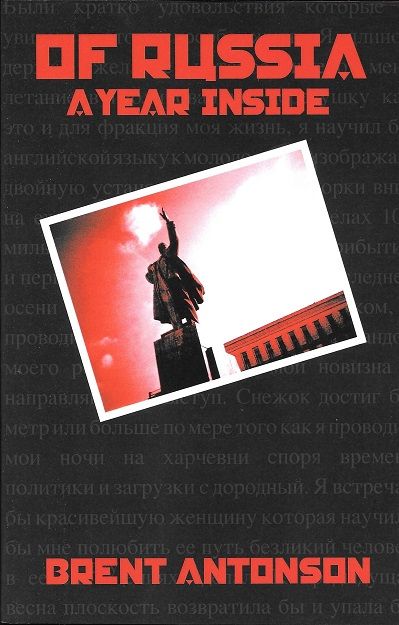
OF RUSSIA: A Year Inside
Brent (Brant is the Russian version) Antonson has seen a Russia few foreigners have. Indeed, few Russians. This young Canadian ventured to Voronezh, eleven hours south of Moscow by train, to spend a year inside a country torn by strife, fresh into a new century, and struggling with the clash between history and future. Tasked with teaching English to students at one university, and then a second, his story is riddled with romance and deception, and punctuated with near disaster and disappointment. Antonson's candor and insights set Russia on the edge of failure and achievement – much like the students he educated, filled with a dash of hope and a lump of fear. His wit did as much to get him in trouble as it did to keep him out of it.

